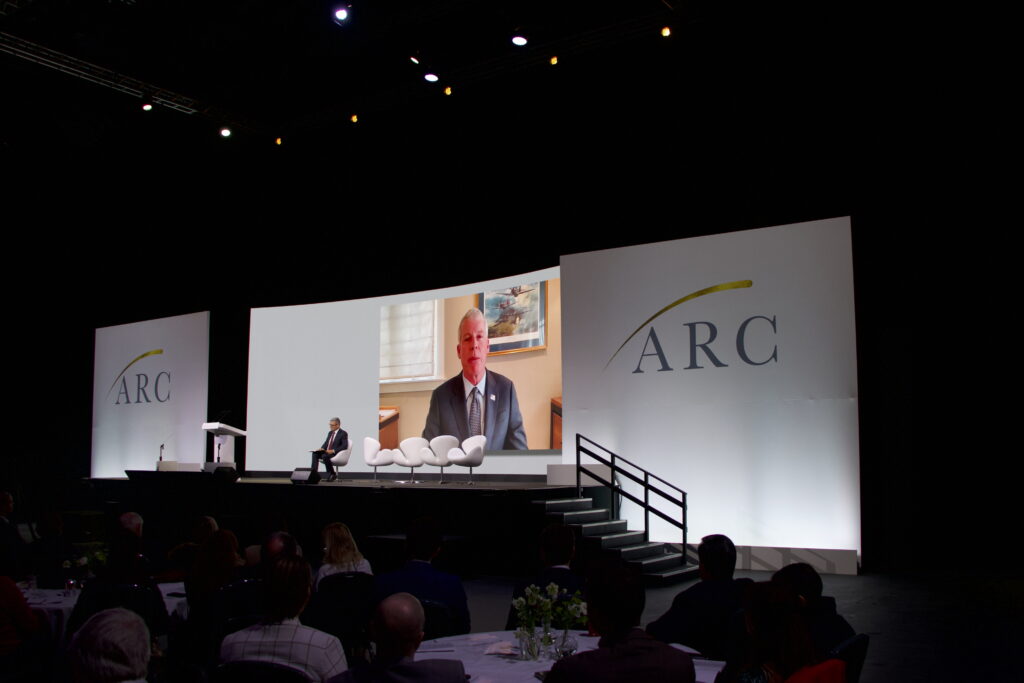As the liquefied natural gas (LNG) boom gained momentum in southwest Louisiana, one public institution of higher learning, McNeese State University, courted the industry to help launch a new LNG Center of Excellence, hired a director doubling as an LNG industry lobbyist, and approached federal regulators to co-locate their own research center at the university, according to emails obtained via public records requests by DeSmog and The Guardian.
A divestment movement aimed at pushing back on the fossil fuel industry’s decades-long creep into classrooms of all levels has grown in recent years out of concerns that industry-sponsored academic research could be a vehicle for climate obstruction. But near the Texas border in Lake Charles, Louisiana, McNeese State University welcomed industry right on in.
McNeese’s leadership team and the LNG industry tout this partnership as mutually beneficial, offering the university funding while providing the industry with educated workers, relevant research, and input on policy. However, alumni, environmental advocates, and researchers say the move raises alarms about fairness and potential conflicts of interest.
Subscribe to our newsletter
Stay up to date with DeSmog news and alerts
Jennie Stephens, a professor of climate justice at Ireland’s Maynooth University who co-authored a first-of-its-kind review of academic and civil society investigations into fossil fuel industry ties to higher education, said the McNeese State University LNG center is part of a larger pattern of private sector interests capturing public universities.
“It’s a classic example of academic capture where the private interests use the public infrastructure for their own profit-seeking motives rather than the needs of the community or the state,” she said. “Sounds like quite an intricate and very blatant example.”
The university’s LNG center aims to serve as a “hub for research, workforce development and safety, and as a depository for best practices for the industry,” according to its former executive director Jason French. This May, the university broke ground on the 23,000-square-foot facility, which will include classrooms and “industrial grade training facilities” that also will be open to LNG employees, according to a press release.
In recent years, McNeese’s relationship with the LNG industry gained momentum when LNG developer Tellurian sought federal approval to build Driftwood LNG 10 miles south of McNeese State University in 2018. The company emailed the university’s then-president, Daryl Burckel, for help. Internal emails obtained through public record requests show Burckel sent a verbatim letter of support ghostwritten by Tellurian to the federal regulator overseeing the construction of LNG export terminals. That wouldn’t be the end of Tellurian and McNeese’s relationship — with the birth of the LNG research center, the mix of corporate influence and university support would only deepen. Tellurian did not respond to requests for comment.
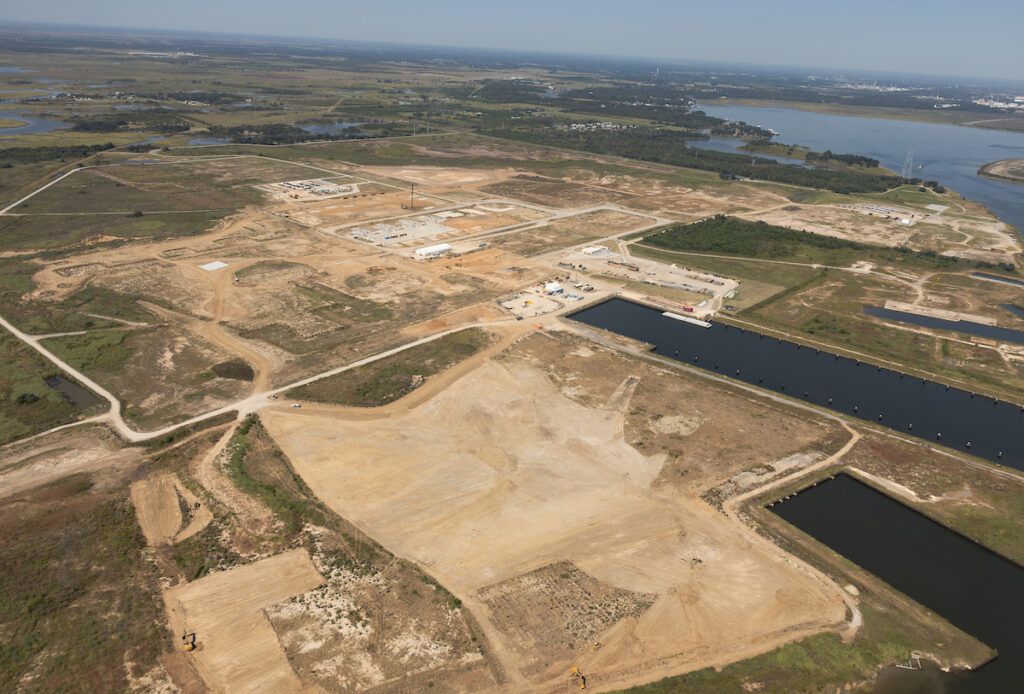
In May 2020, the head of the Lake Area Industry Alliance (LAIA), a lobbying group for industry in southwest Louisiana, raised the idea of an LNG Center of Excellence with Burckel. “I know some people of influence with Cameron LNG, Lake Charles LNG and Tellurian (Driftwood),” the executive director of LAIA, Jim Rock, wrote to Burckel. “If you are interested, I could try to arrange a discussion with them to gage [sic] interest, understand their needs and to get their input on what such a ‘Center’ would look like.”
“This region is now the epicenter of American LNG,” current McNeese president Wade Rousse said in an emailed statement to DeSmog and the Guardian. “And we would be doing a disservice to our students and our mission to not engage this industry.”
A review of internal emails and other documents show how McNeese then ran with the idea of an LNG center.
Tellurian went on to become one of the top donors to the university’s LNG Center of Excellence. The LNG company was among the area LNG developers who recommended McNeese hire Jason French, a Tellurian lobbyist at the time, to head the center, which the university did.
“It is counterintuitive to believe a university would start work on a Center of Excellence in LNG without engaging people working in that industry,” French said.
In the background of McNeese’s interest in creating its LNG center has been the possibility of convincing federal regulators to locate their own research center also at the university, the emails and documents show.
In 2021, Congress passed the PIPES Act of 2020, requiring the U.S. Pipeline and Hazardous Materials Safety Administration (PHMSA) to create an LNG center.
Senator John Kennedy, a Republican of Louisiana — who received more than $26,000 in campaign donations from Tellurian between 2019 and 2024 — advocated for the PHMSA LNG center and drafted the legislation in a way that required that the center be located near LNG facilities along the Gulf Coast. The following year, the university received a $2.8 million grant from the U.S. Economic Development Administration to build the university research center at McNeese to “enhance” the LNG industry.
Internal emails show French attempted to convince PHMSA to locate its LNG safety research center within the center at McNeese, which could allow companies to have proximity to researchers, students, and regulators.
In her criticism of McNeese’s plans, Stephens highlighted concerns about tax dollars supporting public universities that deepened relationships with industries that have environmental and health impacts.
“I think people in the state have good reason to be concerned about this and it is valuable to resist this corporate capture of our universities,” said Stephens, who is currently on leave as Professor of Sustainability Science and Policy at Northeastern University, did postdoctoral research at Harvard’s Kennedy School, and has taught courses at Tufts, Boston University, and MIT. “It’s [American] tax dollars in a public state university that should be advancing the needs of the state and not corporate interests that are extracting and causing ecological damage as well as human health damage.”
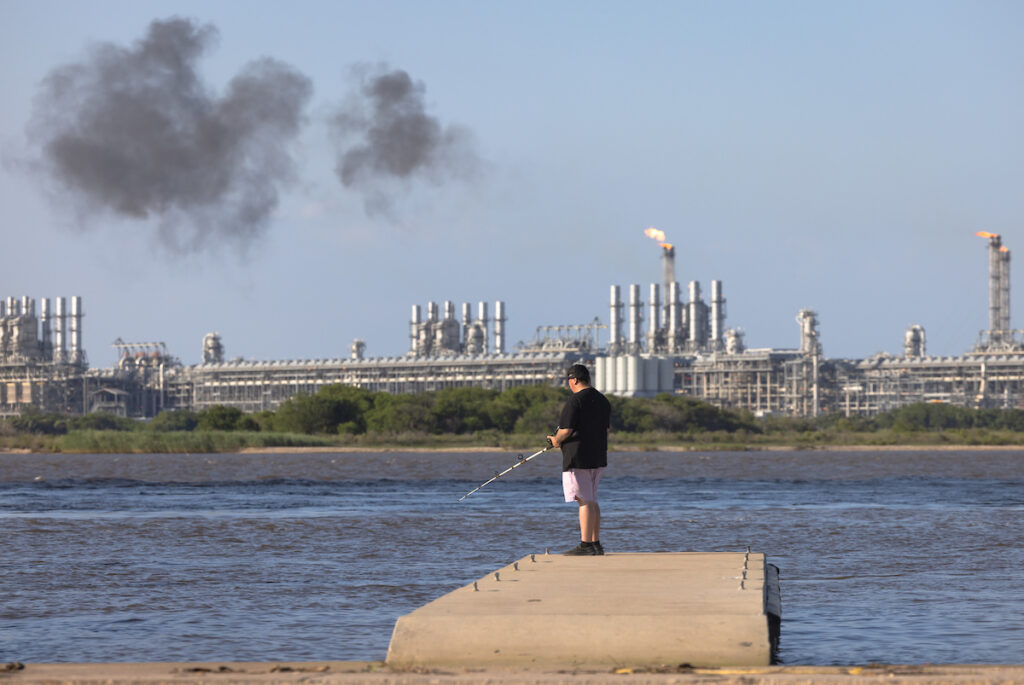
Industry Dollars for Research Votes
Records reviewed through public record requests show that McNeese’s LNG Center of Excellence functioned less as a university’s independent effort to study an ever-growing industry in the area and more as a product of fossil fuel industry influence. It’s not the only energy research center in Louisiana to have developed this way; previous reporting shows that Louisiana State University’s Institute for Energy Innovation was catalyzed by a $25 million donation from Shell. In turn, the flagship university gave the company veto power for research activities.
A slideshow presentation about McNeese’s center lays out a similar model of industry-driven research, with $50,000 donations entitling companies to two votes and $20,000 entitling companies to one vote on the direction of research and development. Donation amounts could be determined by the size of a particular company. An industry advisory committee could select competitive proposals and conduct annual reviews to “ensure maximum benefit to the LNG industry and its stakeholders,” according to the presentation.
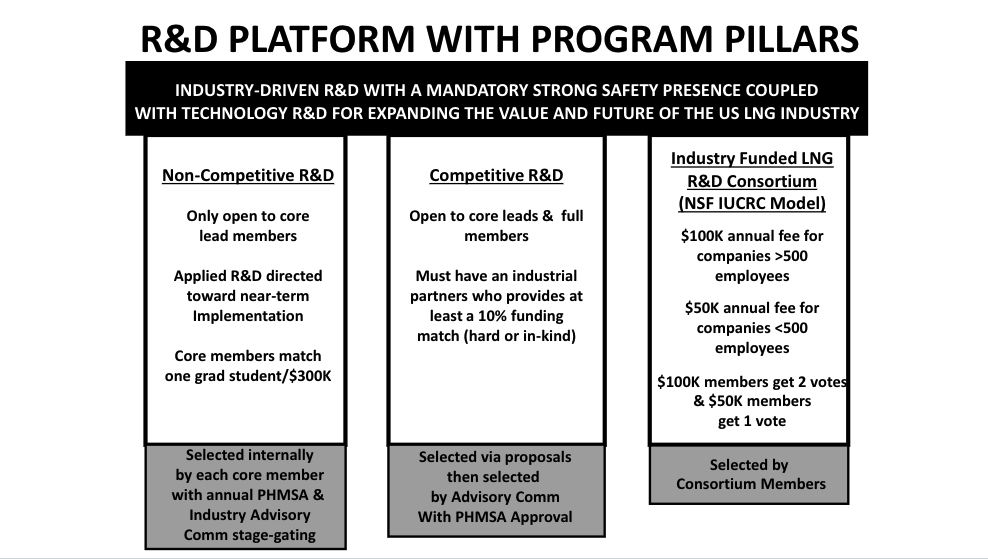
The state and local governing bodies also rolled out the red carpet for Tellurian. While the company contributed $1 million to McNeese’s $10 million LNG center — with 20 percent earmarked for LNG undergraduate certificate scholarships — Tellurian received the single largest tax write-off in American history under Louisiana’s Industrial Tax Exemption Program for the Driftwood facility, a tax break worth $2.8 billion, according to a Sierra Club report. A review of public records indicates that McNeese also secured funding through agreements with the Calcasieu Parish Police Jury, the City of Lake Charles, and Lake Charles Harbor and Terminal District, with each agreement promising $500,000.
Lake Charles, a major industrial center of southwest Louisiana with a population of over 84,000, is poised to house McNeese’s LNG Center of Excellence and the new PHMSA Center of Excellence for LNG Safety. The federal agency confirmed that it had narrowed the siting of its facility to Lake Charles and that McNeese is among the locations being considered.
This October, Tellurian was acquired by Australia-based oil and gas producer Woodside for $900 million and rebranded as Woodside Louisiana LNG. A Woodside Energy spokesperson did not respond to specific questions, but said that the matters in question pre-date the company’s acquisition of Tellurian and that Woodside is investing $650,000 in Louisiana into local community initiatives and projects. Woodside is still integrating with Tellurian and reviewing inherited business relationships. In November, the company requested a construction deadline extension from the U.S. Federal Energy Regulatory Commission (FERC), citing delays, including litigation and uncertainties related to leadership changes following the Woodside acquisition. FERC has extended the overall project completion deadline to April 2029.
James Hiatt, a graduate of McNeese and environmental advocate, said that his alma mater should not blindly support the development of oil and gas projects in the already heavily polluted area. “It’s concerning to me that the former President of McNeese is doing the bidding of a company from elsewhere that is full of untruths,” he said. “I mean, it seems like it’s completely sponsored, that McNeese is functioning as the PR arm of these profiteers who have refused to pay hundreds of millions of dollars in taxes that would fund secondary education, primary schools, the roads, infrastructure, all of these things.”
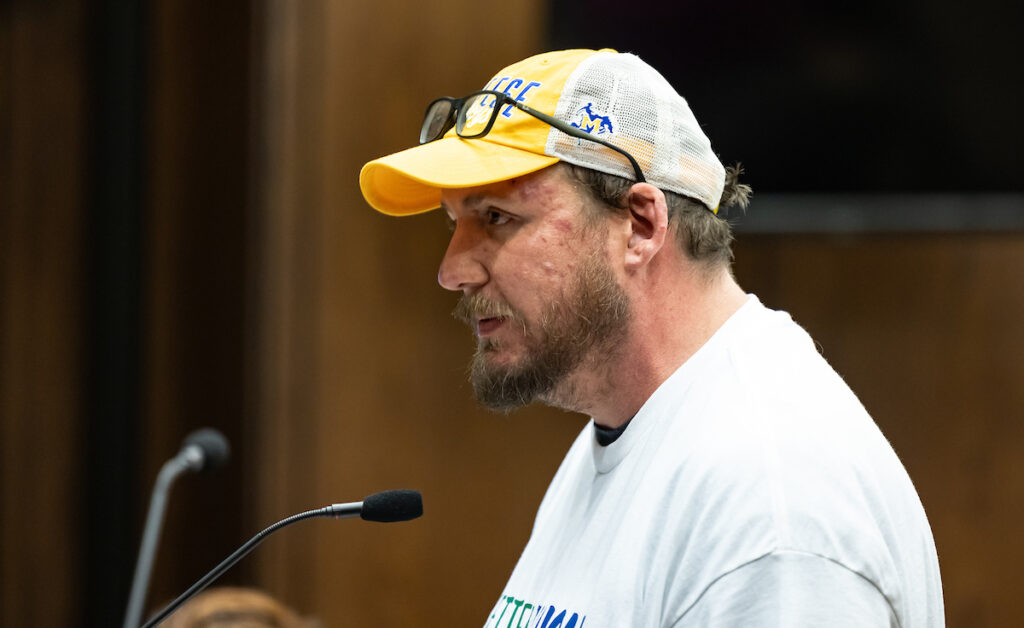
Rousse said the ghostwritten letter of support submitted to FERC for Tellurian by former university president Daryl Burckel illustrates that university presidents manage many responsibilities and requesting a sample letter for a supported project is not uncommon. “McNeese State University, like most universities, relies on philanthropy to meet its mission. And, like most universities, McNeese engages with and studies the industries that create job opportunities for its students,” Rousse said in an emailed statement. “However, no supporter, corporate or otherwise, will ever direct our professors or make unilateral decisions about what is best for the university and its students.”
Roishetta Sibley Ozane, a graduate of McNeese and local environmental justice leader, said that fossil fuel project developers often find support in wealthier, white community leaders who are less likely to be impacted by pollution from the proposed facilities. “But the people most impacted by these projects are the last consulted,” she said.

This week, the U.S. Department of Energy released a much-anticipated update outlining its guidelines for evaluating whether LNG export applications to non-free trade agreement countries are in the “public interest.” The assessment reviews energy, economic, and environmental considerations of future LNG export project applications, and Energy Sec. Granholm’s accompanying statement notes, “that a business-as-usual approach is neither sustainable nor advisable.”
Rock, head of the Lake Area Industry Alliance, did not answer specific questions but said that the three operating LNG export facilities in the Lake Charles area — in addition to five more proposed or under construction — offered good-paying jobs that demand well-trained students, which McNeese’s LNG Center of Excellence would be well suited to provide. “Supporting higher education institutions is nothing new for our area industries,” Rock said, adding that the industry has a history of collaborating with McNeese and the local K-12 schools. “This project is an extension of that rich history,” he said.
Ensuring Industry “Has a Major Say in Research”
At Tellurian’s recommendation, McNeese hired French to head the university’s LNG Center of Excellence in December 2021 without a bid process, and he was initially paid a monthly retainer of $10,000 for his role as executive director of the center. French’s previous roles included positions with BP, Cheniere, Tellurian, and the Louisiana Energy Export Association. Both French and his business partner, Dawn Maisel Cole, registered with the state of Louisiana as Tellurian lobbyists in 2016 and 2017, respectively. In October of this year, French and Cole registered with the state as lobbyists for Woodside Energy.
French left his role as the LNG center’s executive director in May, the same month construction began on the McNeese LNG Center of Excellence. “My work as a consultant for McNeese has been focused on project management – raising funds, facilitating conversations with industry stakeholders, and getting the building to construction,” French said. “I achieved my goals with the Center, and I resigned from the Executive Director role as I always intended.”
Rousse said that French’s knowledge of the industry was a key factor in hiring him, and confirmed that French no longer serves as executive director now that the center is under construction. Still, French received $1,000 per month from the university as a public affairs consultant under a contract set to expire at the end of the year. In an interview with DeSmog and The Guardian, he acknowledged that he served as a consultant to Tellurian, while serving as the center’s director.
“That’s not something I’ve hidden. And I don’t think it conflicts with my role at the university,” he stated. French said he was brought on as someone with industry contacts to help develop the university LNG project and to assist with fundraising. “The role of the center in my mind was really to be something that the university and community could be proud of,” he said.
Naomi Yoder, with The Bullard Center for Environmental and Climate Justice at Texas Southern University, said it was inappropriate for McNeese to hire an LNG industry insider to run an academic center. “The influence of the fossil fuel industry in education right now in southwest Louisiana is already extreme. This recent arrangement is only a continuation and reinforcement of the ‘school to petrochem’ social pipeline that is already deeply ingrained in southwest Louisiana,” they said.
McNeese’s LNG center was initially pitched as a consortium of universities, including the University of Louisiana (UL) at Lafayette and Louisiana State University (LSU) as co-leads. UL Lafayette is still involved. The vision for the McNeese LNG Center of Excellence was first introduced as a “market development center.” Following guidance from Sen. Kennedy’s office, project leadership shifted this vision to focus on safety best practices in the LNG industry to entice PHMSA to locate their center in Lake Charles.
“Unlike many past university research consortia efforts in the U.S., we want to ensure that our LNG industry has a major say in research direction and the evolvement of new innovative training methods,” UL Lafayette’s Mark Zappi wrote in an email to representatives of McNeese, industry, and the City of Lake Charles in June 2023. “Our research consortium will be most effective if it is industry and PHMSA-guided and university-implemented. We want to reinvent R&D such that it is optimized for providing high value to our LNG industry.” Zappi did not respond to requests for comment.
With Jason French’s help, the university convinced the Southwest Louisiana Legislative Delegation (a group of local state legislators), Sen. Kennedy, U.S. Sen. Bill Cassidy, U.S. Rep. Clay Higgins, former governor John Bel Edwards, and Lake Charles Mayor Nic Hunter to advocate for PHMSA’s LNG research center to be located at McNeese. “Our Congressional delegation and other elected officials have been steadfast supporters of this Center and the University,” French said. “None of them had to be ‘convinced’ to support the growth of the University, the region’s most significant industry or bringing a major federal office to our region. Senator Kennedy, in particular, has been instrumental in leading the charge, and should be commended for that.”
French appointed Mayor Hunter as the Executive Board Chair of the McNeese LNG Center of Excellence. “I envision asking for your assistance if we are trying to convince a major player on the industry side to participate and provide leadership on the Center (ie – LNG company, major contractor),” French wrote to Hunter in an email viewed through a public records request. “My intent is never for you to be a primary solicitor of donations. However, we could ask you to come to a meeting with a potential major funder (ie – someone like Gray Stream) to help ‘seal the deal’ and show the community support behind the project.” Gray Stream is a generational landowner and president of M. Stream Management, with ties to oil and gas as well as carbon capture and storage.
“I was asked to participate in that role, and I’ll be honest: until the center gets open, I can’t talk too much about what that means, other than I’m excited to be a part of the center and I agreed when asked,” Mayor Hunter told DeSmog and The Guardian. “I’m excited to have this located in Lake Charles. McNeese is very important to the city of Lake Charles and for McNeese to be the home for a National Center of Excellence is exciting. I think it’s a feather in our cap.”
Yoder said it was confusing that the McNeese academic center is named almost exactly the same as the PHMSA center, even more so because they could be housed at the same university. “How is anyone without intimate knowledge of the connections between the two LNG centers and the LNG industry supposed to know that the LNG industry is bankrolling the products that come out of the centers?” they asked.
All Business, No Climate?
According to emails viewed through a public record request, 27 students were admitted to McNeese’s LNG business certificate program in the fall of 2023. As of this spring, 35 students were enrolled. For McNeese senior and Tellurian scholarship recipient Adian Doyle, the LNG program offered a chance to stay local and build a career. The two-semester program includes LNG-focused finance, accounting, marketing, and economics coursework. Doyle said the program faced growing pains and expressed a need for more rigorous course content from professors who transitioned from other fields without LNG experience.
Doyle’s scholarship from Tellurian has “definitely helped out, especially with living on your own. Being a college student is not an economically viable thing right now, so [the scholarship] definitely helps out with those classes.” However, with Woodside’s October acquisition of Tellurian, Doyle said he is concerned about the program’s future.
Hiatt said local industry jobs are not what they’re cracked up to be. “Before I got a degree, I took a job at a plant, at a refinery. I entered the job with seven people, and everybody told us when we got in here, ‘Oh man, you’re set for life,’” he said. Hiatt said that all seven people with whom he entered the refinery, either quit or are no longer working there “because they wanted a different opportunity.”
While the LNG undergraduate certificate program enables McNeese graduates to earn a living from LNG facilities, it overlooks the environmental and social costs, Ozane said. “It does not teach students about the communities that are impacted, the wetlands that are being obliterated,” she said. “Or how the methane emissions being released are warming our climate and implicitly contributing to these climate-induced disasters we’re facing.” This is consistent with a 2022 study finding fossil fuel–funded university research centers reporting more favorable policy positions towards the natural gas industry.
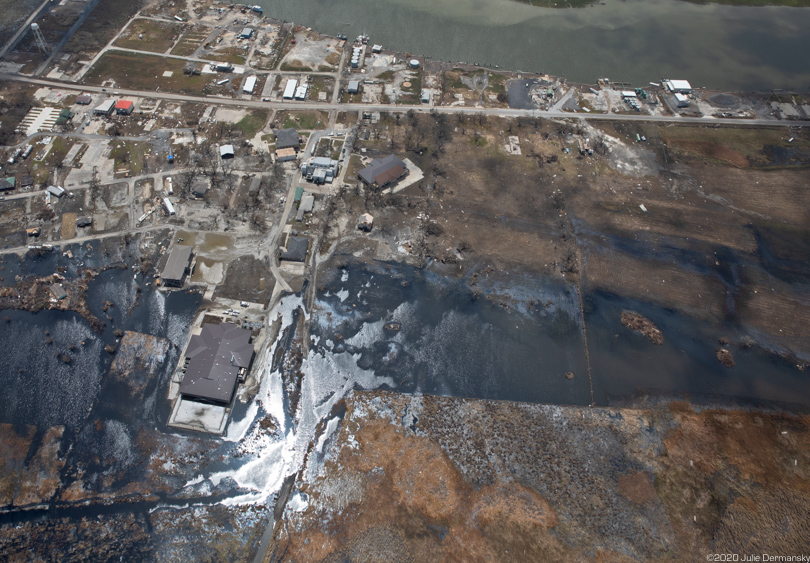
French said that he was proud to have contributed to McNeese’s LNG center because of LNG’s role in lowering emissions from the coal it displaces. Research suggests the opposite is true: An October 2024 study published in the journal Energy Science & Engineering found that the greenhouse gas emissions of LNG are 33 percent higher than coal over a 20-year period.
Hiatt noted that the McNeese campus had considerable damage from Hurricane Laura in 2020, a category four storm that bore the hallmark rapid intensification of climate change. “The school itself has been wrecked again and again by climate disasters that are completely 100 percent caused by our collective dependency on fossil fuels, and these fossil fuel companies continue down that path when there are other opportunities,” he said. “McNeese is pigeonholing students into continued dependence on fossil fuel jobs.”
This story is co-published with The Guardian and part of the “Captured Audience” series, which is supported by a grant from the Fund for Investigative Journalism.
Editors’ note: Sara Sneath is a freelance investigative climate journalist based in New Orleans. In January 2025 she will take up a research analyst role at the Climate Accountability Lab at the University of Miami, led by Geoffrey Supran who was a co-author with Jennie Stephens of the study mentioned in this article about industry ties to higher education.
Subscribe to our newsletter
Stay up to date with DeSmog news and alerts



